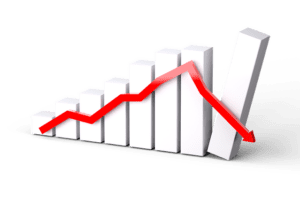

Are you aware that the Indian stock market(BSE and NSE) has been correcting(when the market falls, it’s called ‘correcting’) for the last few weeks, and corrected or fell really sharply a couple of days ago ? Even if you have no idea of the stock or share market and do not invest any money in the stock market, it is unlikely that you haven’t heard about the market fall, it’s all over the news, newspapers have it on the front page, and the new stock investors/traders, especially the Gen Z investors, who started investing during the past two years, who haven’t seen a major correction are panicking. You might have had the question as to why the markets are falling. I’ll try to answer that I this article.
A stock market crash is when there is a sudden and unexpected decline in prices of the stocks or shares of the companies that comprise the stock market. It can be due to a variety of reasons like speculation, war, a natural calamity or a slow down in the economy. The real reason for the market crash could have been building up over time, but the market crash or sudden sharp correction often happens on the happening of a trigger event. Let us now go into the reasons for the current fall:
- Foreign Institutional Investors(FIIs) selling: FIIs have been net sellers in the Indian stock market since October 2024. FIIs or Foreign Institutional Investors are foreign banks, insurance companies and investment houses that invest in the Indian stock market in order to profit from it’s growth. They have been selling in the Indian markets because of a number of reasons:
- Falling value of the Indian rupee(INR) against the US Dollar(USD)– The rupee has been falling in value against the US dollar to Rs. 86.66 to a dollar today from 84.72 to a dollar on 2nd December 2024.
- Improving market sentiment in the US : The latest jobs data from the US puts the unemployment level at 4%, which is better than expected. This means that the US economy is resilient and there might be better opportunities to invest in the US in the future. This is leading FIIs to sell in the Indian market and redeploy their funds in the US markets.
- The coming presidency of Donald Trump in the US:Donald Trump is expected to bring about a lot of changes in US policy and impose tariffs on trade with a number of countries. Such tariffs, or increased tariffs will have an impact on trade, and thereby the export sales of Indian companies to the US and thus affect profits. Any loss in profits of a company will lead to a fall in it’s share/stock price.
- Concerns about the Indian economy: There are concerns that the Indian economy may not continue to grow at the same speed in the future as it has in the past. This is also due to inflation which causes the purchasing power of the rupee and thereby the purchasing power of the consumers.


- Geopolitical uncertainties : Markets do not like uncertainties of any kind. War is a big disruptor of economies. It can also lead to large scale loss of life and destruction of property. Wars are going on currently in Ukraineand the Middle East. These wars, especially the one in the Middle East can lead to the price of crude oil going up, and this will affect a country like India as India imports 80% of it’s oil needs.
- Fears of the market being overvalued: The Indian share market has had a bull run(a bull run means that the stock prices are going up) since the days of Covidand this has led to the stocks/shares of a lot of companies rising to very high multiples of their earnings. These high multiples are not always justified. A stock whose price is overvalued can suffer a massive fall when the markets correct. When a lot of such company stocks lose value, it contributes further to the falling market.
While we have discussed the reasons for the stock market falling above, it is very important to know how to deal with our finances/ investing when the market is falling:
- Avoid panic selling :This is very important and is easier said than done. Imagining watching the value of your hard earned money going down. Money that you have worked vary hard for and toiled over the years to earn and then have maintained the discipline to save so that you can invest it in the stock market for returns that are better than that of other safer avenues. That very money instead of increasing is decreasing at a very fast clip ! How can you not panic ?! A falling market can cause even the seasoned investor to curse the day he or she decided to put their hard earned money in to stocks. However, the investor has to bear in mind that the share price decreases in a market crash are only a potential or unrealized loss, and the share price can and will probably come up over time so long as the company whose shares you invested in is a good company. Selling at the loss or reduced share price will only turn your unrealized loss into a realized one. And once you have sold your stocks and realized your loss, you cannot benefit when the price of the share goes up.
- Avoid panic buying: Similar to panic selling, you should also avoid panic buying. Panic buying refers to the practice of buying stocks in a panic when you feel the market crash has brought the share prices to an attractive level. When you buy in a state of panic, you can forget to do proper research into the stock you are purchasing or the price may fall further after you buy the stock.
- Do not sop SIPs: SIPs or Systematic Investment Plans of mutual funds are plans wherein the investor invests a fixed amount of money into a mutual fund in order to take advantage of the swings in the stock market. When there is a stock market crash, the price of the mutual units falls as the price of the stocks in it’s portfolio fall. This means the SIP investments done during this time can give you better returns when the market recovers(comes up again).


Conclusion
The stock market has been falling since the past few weeks and fell very sharply a couple of days ago. The market falling(‘correcting’) is in the very nature of the stock market, the markets rise and fall in response to economic conditions and events. The Indian markets’ performance is affected by FII investment flows, the perception of market valuation, state of the Indian economy, geopolitical events and purchasing behaviour of the people which is impacted by inflation. Though the market is falling, the investors should follow certain behaviours like not buying or selling shares in panic and continuing with their mutual fund SIPs to minimize the impact of the fall in share prices.









